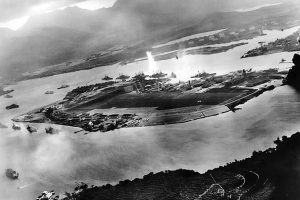
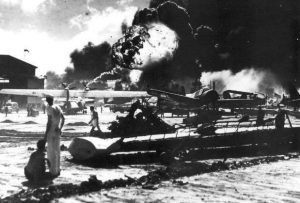 The 83rd anniversary of Pearl Harbor, at least for the Baby Boomer generation and older, prompts reflection on the United States’ stance of often waiting for an initial attack before responding. While this is not always the case, it appears to be a common scenario. The US strives to act as a peacemaker, and the decision to go to war is never taken lightly due to the grave consequences of taking lives. Typically, numerous warnings are issued before any action is taken, and frequently, it’s too late to preemptively strike. The first to strike is often labeled the aggressor, but there are times when ample warning signals an imminent attack, yet the response is still delayed, until the attack occurs, resulting in loss of life and leaving the survivors to deal with the aftermath rather than considering an immediate counterstrike. Of course, the reverse is hard to deal with too, because we would come off as being the aggressor, and that just isn’t our style.
The 83rd anniversary of Pearl Harbor, at least for the Baby Boomer generation and older, prompts reflection on the United States’ stance of often waiting for an initial attack before responding. While this is not always the case, it appears to be a common scenario. The US strives to act as a peacemaker, and the decision to go to war is never taken lightly due to the grave consequences of taking lives. Typically, numerous warnings are issued before any action is taken, and frequently, it’s too late to preemptively strike. The first to strike is often labeled the aggressor, but there are times when ample warning signals an imminent attack, yet the response is still delayed, until the attack occurs, resulting in loss of life and leaving the survivors to deal with the aftermath rather than considering an immediate counterstrike. Of course, the reverse is hard to deal with too, because we would come off as being the aggressor, and that just isn’t our style.
On December 7, 1941, the United States found itself in a precarious position. Despite repeatedly warning Japan, the United States using the Hull Note as a show of the ultimate caution, tried to avoid entering World War II. The Hull Note officially the Outline of Proposed Basis for Agreement Between the United States and Japan, was the final proposal delivered to the Empire of Japan by the United States of America before the attack on Pearl Harbor (December 7, 1941) and the Japanese declaration of war (seven and a half hours after the attack began). Unfortunately, Japan to all that as a show of weakness. Nevertheless, knowing that Japan would likely not comply, and essentially declaring war, the US still hoped they would proceed slowly, perhaps 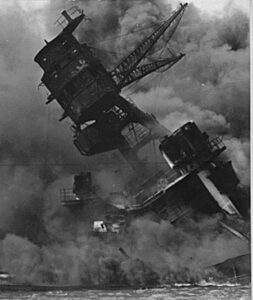 even reconsider their course. Conversely, Japan acted swiftly, dispatching their strike force towards Pearl Harbor and simultaneously sending a decoy towards Thailand to mislead the US. Then, believing an attack on Thailand was imminent, President Roosevelt implored Emperor Hirohito via telegram to act “for the sake of humanity” and prevent further devastation. The US endeavored to maintain peace.
even reconsider their course. Conversely, Japan acted swiftly, dispatching their strike force towards Pearl Harbor and simultaneously sending a decoy towards Thailand to mislead the US. Then, believing an attack on Thailand was imminent, President Roosevelt implored Emperor Hirohito via telegram to act “for the sake of humanity” and prevent further devastation. The US endeavored to maintain peace.
After transmitting the telegram, President Roosevelt was working on his stamp collection alongside his personal advisor, Harry Hopkins. They deliberated over Japan’s rejection of the Hull Note. Hopkins proposed a preemptive strike by America, but President Roosevelt maintained that it was not an option. Unbeknownst to them, it was already too late for a first strike…time had run out. The Japanese forces were en route to Pearl Harbor, where a significant segment of the Pacific Fleet lay anchored, vulnerable to attack. The impending ambush would devastate 18 US ships, including the Arizona, Virginia, California, Nevada, and West Virginia, either destroyed, sunk, or capsized. Over 180 aircraft were destroyed on the ground, with an additional 150 damaged, leaving a mere 43 operational. American casualties exceeded 3,400, with over 2,400 fatalities—1,000 of which occurred on the Arizona alone. The Japanese incurred fewer than 100 losses.
It often appears that the party who strikes first, swiftly and with the element of surprise, ultimately fares better. The side caught off guard, or the one that ignored the warning signs, is usually defeated. With one of the strongest military forces on Earth, America should not be taken by surprise. I believe that overconfidence in one’s strength, leading to a lack of vigilance, can result in the downfall of even the mightiest. The United States has been such a force, but our reluctance to preemptively strike seems to invite repeated attacks without warning. It is only after such attacks that we seem to retaliate.
It’s indeed a dilemma, perhaps reflective of President Roosevelt’s perspective. If we strike first, we’re vilified globally as the aggressors, akin to those at Pearl Harbor. If we don’t, we face condemnation from our own citizens. Moreover, our intelligence isn’t infallible, leading to situations like the surprise attack on December 7th, 1941, when we expected honor from an adversary who did not feel bound by it. It seems that although being 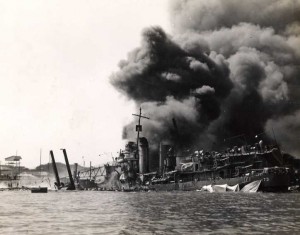
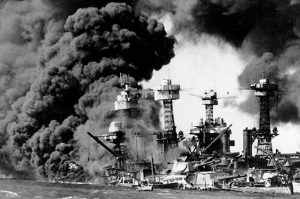 attacked unprovoked is undesirable, we must still act honorably and not launch a preemptive strike merely based on anticipated aggression. Otherwise, we become indistinguishable from those nations we confront in war for their acts of invasion. Nevertheless, it remains a huge challenge to always be the nation that does the right things, especially when there is a profound mistrust of our enemies…because we know better.
attacked unprovoked is undesirable, we must still act honorably and not launch a preemptive strike merely based on anticipated aggression. Otherwise, we become indistinguishable from those nations we confront in war for their acts of invasion. Nevertheless, it remains a huge challenge to always be the nation that does the right things, especially when there is a profound mistrust of our enemies…because we know better.


Leave a Reply